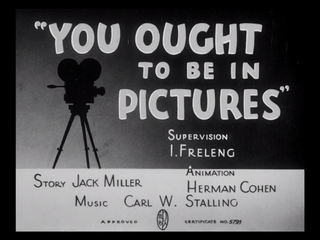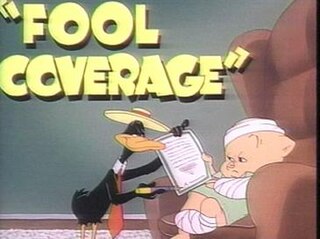Related Research Articles

Looney Tunes is an American media franchise produced and distributed by Warner Bros. The franchise began as a series of animated short films that originally ran from 1930 to 1969, alongside the related series Merrie Melodies, during the golden age of American animation. Following a revival in the late 1970s, new shorts were released as recently as 2014. The two series introduced a large cast of characters, including Bugs Bunny, Daffy Duck, and Porky Pig. The term Looney Tunes has since been expanded to also refer to the characters themselves.

Daffy Duck is a cartoon character created by animators Tex Avery and Bob Clampett for Leon Schlesinger Productions. Styled as an anthropomorphic black duck, he has appeared in cartoon series such as Looney Tunes and Merrie Melodies, in which he is usually depicted as a foil for either Bugs Bunny, Porky Pig or Speedy Gonzales. He was one of the first of the new "screwball" characters that emerged in the late 1930s to replace traditional everyman characters who were more popular earlier in the decade, such as Mickey Mouse, Porky Pig, and Popeye.

Merrie Melodies is an American animated comedy short film series distributed by Warner Bros. Pictures. It was part of the Looney Tunes franchise and featured many of the same characters. It originally ran from August 2, 1931, to September 20, 1969, during the golden age of American animation, though it was revived in 1979, with new shorts sporadically released until June 13, 1997. Originally, Merrie Melodies placed emphasis on one-shot color films in comparison to the black-and-white Looney Tunes films. After Bugs Bunny became the breakout character of Merrie Melodies and Looney Tunes transitioned to color production in the early 1940s, the two series gradually lost their distinctions and shorts were assigned to each series randomly.

Golden Yeggs is a 1950 Warner Bros. Merrie Melodies short directed by Friz Freleng. The cartoon was released on August 5, 1950, and stars Daffy Duck and Porky Pig. A forerunner of the Rocky and Mugsy characters appear, with Rocky already in his present-day form.

You Ought to Be in Pictures is a 1940 Warner Bros. Looney Tunes short film directed by Friz Freleng. The cartoon was released on May 18, 1940, and stars Porky Pig and Daffy Duck.

The Scarlet Pumpernickel is a 1950 Warner Bros. Looney Tunes theatrical cartoon short, directed by Chuck Jones and written by Michael Maltese. The cartoon was released on March 4, 1950, and stars Daffy Duck along with a number of other prominent Looney Tunes characters. The title is a play on the 1905 novel The Scarlet Pimpernel.

A Corny Concerto is a 1943 Warner Bros. Merrie Melodies directed by Bob Clampett. The short was released on September 25, 1943, and stars Bugs Bunny, Porky Pig, Elmer Fudd and Daffy Duck.

Daffy Duck & Egghead is a 1938 Warner Bros. Merrie Melodies cartoon produced in 1937 and directed by Tex Avery. The cartoon was released on January 1, 1938, and stars Daffy Duck and Egghead.

Daffy Duck Slept Here is a 1948 Warner Bros. Merrie Melodies cartoon, directed by Robert McKimson. The cartoon was released on March 6, 1948, and stars Porky Pig and Daffy Duck.

Conrad the Sailor is a 1942 Warner Bros. Merrie Melodies cartoon supervised by Chuck Jones. The title character, Conrad the Cat, is voiced by Pinto Colvig and animated by the quintet. The other featured player is Daffy Duck, voiced as usual by Mel Blanc.

Fool Coverage is a 1952 Warner Bros. Looney Tunes cartoon directed by Robert McKimson. The cartoon was released on December 13, 1952, and stars Daffy Duck and Porky Pig.

My Little Duckaroo is a 1954 Warner Bros. Merrie Melodies theatrical cartoon short directed by Chuck Jones and written by Michael Maltese. The cartoon was released on November 27, 1954 and stars Daffy Duck and Porky Pig.

The Stupor Salesman is a Warner Bros. Looney Tunes cartoon, directed by Arthur Davis, and written by Lloyd Turner and Bill Scott. The cartoon was released on November 20, 1948, and stars Daffy Duck.

This Is a Life? is a 1955 Warner Bros. Merrie Melodies animated cartoon directed by Friz Freleng, written by Warren Foster, and produced by Edward Selzer, with music directed by Milt Franklyn. The short was released on July 9, 1955, and stars Bugs Bunny. The voices were performed by Mel Blanc, Arthur Q. Bryan, and June Foray in her first work for Warner Bros. This is one of the few Bugs Bunny cartoons whose title does not contain Bugs, bunny, rabbit/wabbit or hare.

To Duck or Not to Duck is a 1943 Warner Bros. Looney Tunes cartoon directed by Chuck Jones. The cartoon was released on March 6, 1943, and stars Daffy Duck and Elmer Fudd.
Along Came Daffy is a 1947 Warner Bros. Looney Tunes cartoon directed by Friz Freleng and written by Michael Maltese and Tedd Pierce. The cartoon was released on June 14, 1947, and stars Daffy Duck and Yosemite Sam.

You Were Never Duckier is a 1948 Warner Bros. Merrie Melodies cartoon directed by Chuck Jones. The cartoon was released on August 7, 1948, and stars Daffy Duck and Henery Hawk.

Daffy Dilly is a 1948 Warner Bros. Merrie Melodies cartoon directed by Chuck Jones. The cartoon was released on October 30, 1948, and stars Daffy Duck.
The High and the Flighty is a 1956 Warner Bros. Merrie Melodies cartoon directed by Robert McKimson and written by Tedd Pierce. The short was released on February 18, 1956, and stars Daffy Duck, Foghorn Leghorn and the Barnyard Dawg.
References
- ↑ Beck, Jerry; Friedwald, Will (1989). Looney Tunes and Merrie Melodies: A Complete Illustrated Guide to the Warner Bros. Cartoons. Henry Holt and Co. p. 247. ISBN 0-8050-0894-2.
- ↑ Lenburg, Jeff (1999). The Encyclopedia of Animated Cartoons. Checkmark Books. pp. 60–62. ISBN 0-8160-3831-7 . Retrieved 6 June 2020.